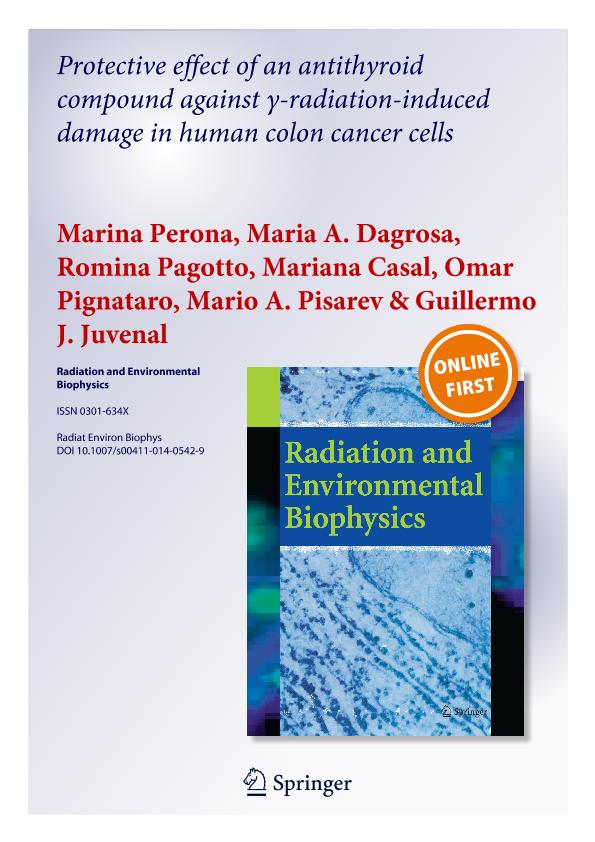Artículo
Protective effect of an antithyroid compound against γ-radiationinduced damage in human colon cancer cells
Perona, Marina ; Dagrosa, María Alejandra
; Dagrosa, María Alejandra ; Pagotto, Romina María del Luján
; Pagotto, Romina María del Luján ; Casal, Mariana; Pignataro, Omar Pedro
; Casal, Mariana; Pignataro, Omar Pedro ; Pisarev, Mario Alberto
; Pisarev, Mario Alberto ; Juvenal, Guillermo Juan
; Juvenal, Guillermo Juan
 ; Dagrosa, María Alejandra
; Dagrosa, María Alejandra ; Pagotto, Romina María del Luján
; Pagotto, Romina María del Luján ; Casal, Mariana; Pignataro, Omar Pedro
; Casal, Mariana; Pignataro, Omar Pedro ; Pisarev, Mario Alberto
; Pisarev, Mario Alberto ; Juvenal, Guillermo Juan
; Juvenal, Guillermo Juan
Fecha de publicación:
04/2014
Editorial:
Springer
Revista:
Radiation and Environmental Biophysics
ISSN:
0301-634X
Idioma:
Inglés
Tipo de recurso:
Artículo publicado
Clasificación temática:
Resumen
We have previously reported the radioprotective effect of propylthiouracil (PTU) on thyroid cells. The aim of the present study was to analyze whether tumor cells and normal cells demonstrate the same response to PTU. Human colon carcinoma cells were irradiated with γ-irradiation with or without PTU. We evaluated the clonogenic survival, intracellular reactive oxygen species levels, catalase, superoxide dismutase and glutathione peroxidase activities, and apoptosis by nuclear cell morphology and caspase-3 activity assays. Cyclic AMP (cAMP) levels were measured by radioimmunoassay. PTU treatment increased surviving cell fraction at 2 Gy (SF2) from 56.9 ± 3.6 in controls to 75.0 ± 3.5 (p<0.05) and diminished radiation- induced apoptosis. In addition, we observed that the level of antioxidant enzymes’ activity was increased in cells treated with PTU. Moreover, pretreatment with PTU increased intracellular levels of cAMP. Forskolin (p<0.01) and dibutyryl cAMP (p<0.05) mimicked the effect of PTU on SF2. Co-treatment with H89, an inhibitor of protein kinase A, abolished the radioprotective effect of PTU. PTU reduces the toxicity of ionizing radiation by increasing cAMP levels and also possibly through a reduction in apoptosis levels and in radiation-induced oxidative stress damage. We therefore conclude that PTU protects both normal and cancer cells during exposure to radiation in conditions mimicking the radiotherapy.
Palabras clave:
Colon Cancer
,
Ionizing Radiation
,
Propylthiouracil
,
Radioprotection
,
Thyroid
Archivos asociados
Licencia
Identificadores
Colecciones
Articulos(IBYME)
Articulos de INST.DE BIOLOGIA Y MEDICINA EXPERIMENTAL (I)
Articulos de INST.DE BIOLOGIA Y MEDICINA EXPERIMENTAL (I)
Articulos(SEDE CENTRAL)
Articulos de SEDE CENTRAL
Articulos de SEDE CENTRAL
Citación
Perona, Marina; Dagrosa, María Alejandra; Pagotto, Romina María del Luján; Casal, Mariana; Pignataro, Omar Pedro; et al.; Protective effect of an antithyroid compound against γ-radiationinduced damage in human colon cancer cells; Springer; Radiation and Environmental Biophysics; 53; 3; 4-2014; 611-619
Compartir
Altmétricas



